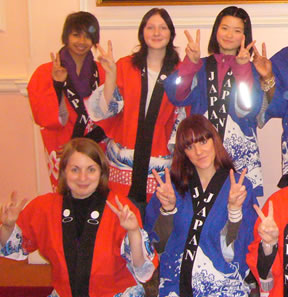According to a recent survey by the Japan Foundation, there are over 19,600 people currently studying Japanese in the UK, more people than in any other European Country. With the Japanese Language Proficiency Test (JLPT) and speech contests in business Japanese and for university students, as well as the Embassy's popular Club Taishikan Programme, there are many opportunities for residents of the UK, whether taking up the language for the first time or building upon a pre-existing foundation.
First offered in 1984, participation in the Japanese Language Proficiency Test (JLPT) has grown considerably over the years. In its first year, approximately 7,000 people sat the test in 15 countries. By 2009, it was offered in 54 countries and sat by 770,000 people. The 2010 test was sat by 738 people in London in December. The JLPT has undertaken some significant changes in 2010 and now places more importance on communicative competence. Perhaps the biggest change is that it is now offered in five levels, giving examinees a better chance of finding the right level to select a more appropriate level. |

Participants in The Sixth Japanese Speech Contest for University Students |
This year's Sir Peter Parker Awards for Spoken Business Japanese took place on 16 February, 2011 at the School of Oriental and African Studies (SOAS) in London. Set up in 1990 by the Japan External Trade Organisation together with SOAS, the awards aim to deepen the understanding of Japanese business culture through the study of the Japanese language. This year's winner was Ms Kim Woodruff with her speech entitled 'Overcoming Communication Gaps in Japanese Business Situations'. Ms Woodruff, a Japanese learner for 12 years, chose Japanese partly because of a fascination with the Japanese band Pizzicato Five she developed after hearing them on Radio 1 one night. On winning, she said, 'I was so delighted and bowled over to win the contest! I had taken part in it last year too and was quite inspired by Magdalena Cebula (who won 1st prize in 2010)'. Her advice to learners is to learn the language in a way that relates to your own wider interests, 'whether that's listening to songs that you enjoy anyway (and trying to sing them at karaoke), watching films that you really like (maybe with the English subtitles off once you know them well!), or even reading your favourite children's books translated into Japanese. If children's books are too hard, try finding some Japanese menus and working out as many katakana words as you can!'
The Sixth Japanese Speech Contest for University Students, organised by the British Association for Teaching Japanese as a Foreign Language (BATJ) and the Japan Foundation, took place on Saturday, 26 February. Speech Category 1 (Studying Japanese as a main degree subject or as part of a degree course) was won this year by Andrew Lyttle of the School of Oriental and African Studies, University of London with his speech 'Rehabilitation Facilities for Parolees in Japan: Why should local citizens support rehabilitation facilities'. First place in Speech Category 2 (Studying Japanese as an elective or optional course) went to Edwin Goh, a chemical engineering undergraduate at Imperial College London with his speech 'Light novel fan translation'. Judge and JICC director Minister Ken Okaniwa said, 'All the finalists are commended for having the courage to participate. I hope those who have not yet started learning Japanese will be inspired to do so.' |
According to the Japan Foundation, the largest group of learners in this country is made up of secondary school students, with over 8,000 students at this level. The Embassy's popular Club Taishikan programme welcomed 300 such pupils between April 2010 and March 2011. Radha Parmar, of Westwood Girls' College for Languages and Arts, who visited in February 2011 has been studying Japanese for two and a half years. A big manga and anime fan, Radha chose Japanese when she found that two of her cousins were in Japan teaching English. She says 'I would like to travel to Japan in my gap year to help school children learn English. If I know the language it means I can travel a lot more with no language barriers.'
When asked if Japanese is really as hard as everyone says it is Radha said 'At first glance of the Japanese syllabaries you get a bit intimidated and start wondering "how on earth am I supposed to remember all these characters?". But once you start to read Japanese words or listen you start to get used to it. It did help that I had a big interest in the culture. I have to admit that learning kanji is probably the hardest part of the learning process but I am sure that it will become easier with practice.'
With so many opportunities available to UK residents, there really is no better time to take up Japanese. |

Radha Parmar, top left, during 'Club Taishikan' |
|

